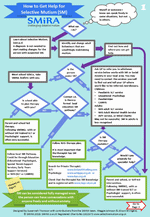
Selective Mutism, sometimes called Situational Mutism, is an anxiety-based mental health disorder which usually commences in early childhood. Those with SM speak fluently in some situations but remain consistently silent in others. They may have a blank expression, or appear ‘frozen’ when expected to speak.
With early intervention the prognosis for recovery is good, but in some cases it may persist and last right through a child’s school life and sometimes even into adulthood. It is important to understand that those with SM want to speak, but find themselves physically unable to do so due to their anxiety.

Communication is crucial, it is a fundamental human right. ”
John Bercow,
The Bercow Report
Diagnosis
The essential feature of Selective Mutism is the persistent failure to speak in specific social situations (e.g. at school, with peers and/or the teacher), despite being able to speak in other, more familiar situations. For the diagnosis to be made, the condition has to be sufficiently strong to:
- Interfere with the child’s education and social and cognitive development.
- The duration of the disturbance is at least one month beyond the first month as school.
- The failure to speak must not be due to a lack of knowledge of the language.
- The condition cannot be better explained by a communication disorder (e.g. stuttering) or:
Any other abnormality.
For unknown reasons, Selective Mutism appears to be more prevalent amongst girls and more cases are reported from migrant and multi-lingual families.
Further help and information
 Information on how to get help with Selective Mutism can be found via the link below:
Information on how to get help with Selective Mutism can be found via the link below:
How to get help
 Please also see our extensive range of leaflets for parents, teens & adults, and professionals in the Information section:
Please also see our extensive range of leaflets for parents, teens & adults, and professionals in the Information section:
Information

